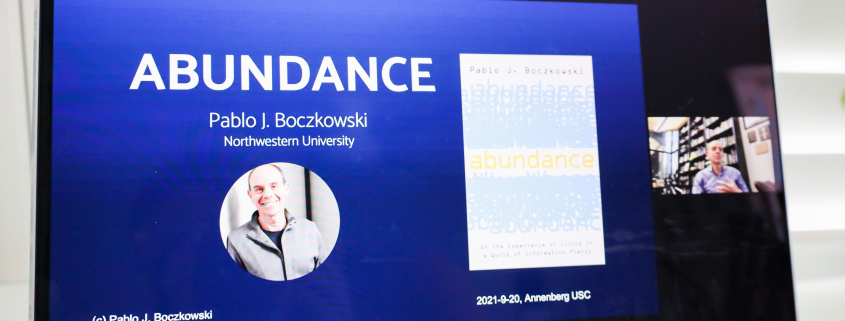Seminar explores Argentine problems

Exploring the cultural and societal impacts of the unprecedented amount of information newly available to people on the internet, Northwestern University communications professor Pablo J. Boczkowski discussed the findings published in his latest book, “Abundance: On the Experience of Living in a World of Information Plenty,” at a virtual Annenberg Research Seminar Monday. The discussion focused on the relationship between Argentines and the online media — specifically, the internet in becoming a part of people’s daily routines and communication methods.
In addition to authoring three books, four edited volumes and more than 40 journal articles, Boczkowski currently serves as the founder and director of Northwestern’s Center for Latinx Digital Media, and the co-founder and co-director of the Center for the Study of Media and Society in Argentina at the Weizenbaum Institute for the Networked Society in Germany. “Abundance” is among several of Boczkowski’s works focusing on people’s changing attitudes towards the media.
Boczkowski began his presentation by explaining his hopes for “Abundance” to offer a new way for scholars in his field to analyze the high volumes of data online.
“The basic idea behind information overload … is this notion that there is a sweet spot of information … and after that sweet spot, things go downhill,” Boczkowski said. “This is the main way in which the social and behavioral sciences have approached this experience of living in a world with a lot of information.”
To Boczkowski, addressing the issue with the term “information abundance” instead of information overload would allow for scholars to understand the world “in a broader perspective.”
“[If the ‘information overload’ perspective] is not necessarily a limitation, it is, at least, a very partial approach to the phenomenon,” Boczkowski said. “In this book, I adopt the notion of abundance as an alternative to try to understand multiple uses of information — some of which are instrumental, some of which are relational.”
From March 2016 to December 2017, Boczkowski and his co-workers conducted their research for “Abundance” in Argentina’s capital, Buenos Aires and five other provinces in Argentina. Boczkowski ultimately used the data to create what he said is the first book-length text seeking to address “information abundance in the Global South.” Boczkowski’s team performed 158 “semi-structured interviews” and surveyed 700 Argentine citizens in-person. Boczkowski recounted speaking to the citizens about their perceptions of media bias, the negative emotional impacts of regularly consuming news and the outside influences affecting individuals who interact with information online.
Boczkowski, an Argentine himself, said he chose to conduct his research in Argentina because, unlike populations in countries in the Northern hemisphere, Argentine people experience high rates of material scarcity.
“In the U.S., in Canada, in Germany, in the Netherlands, accessing the technologies that connect people to a world of ‘information plenty’ is something that is quite taken for granted,” Boczkowski said. “But in a country like Argentina … the decision to get access to these tools is much more meaningful because it represents a very important portion of the disposable income of people.”
Jonathan Aronson, a professor at the Annenberg School of Communication and Journalism and in the department of international relations for the Dornsife School, attended the seminar.
“I think that it brought home some things about [how] … the value of news has been less, even as there is more information out there,” Aronson said. “People absorb a great deal of news — hence abundance, or overabundance. On the other hand, its impact on them seems to be less.”
Yue Yang, another attendee, also appreciated Boczkowski’s comments that addressed people’s increasing distrust towards the media and institutions as a whole.
“I find [Boczkowski’s] discussion about the ritualization of news and how people devalue news, interesting and relevant,” said Yang, a recent graduate of Annenberg’s doctoral program. “If people are just listening to the news or watching it as something ambient, rather than paying attention to it, and they just keep it around, but do not value or trust it, then maybe media studies people or journalism scholars should also reflect on how they think about the role of news in today’s world.”
Boczkowski encourages readers to “de-center the media when discussing communication phenomena.”
“Communication is about making meaning,” Boczkowski said. “It’s about making meaning together, and becoming a collective, in the process of making meaning.”

